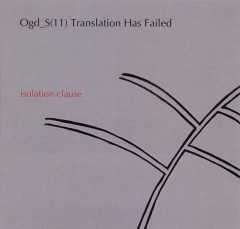CD Reviews
NATHAN HUBBARD: Ogd_S(11) Translation Has Failed: isolation clause
It was 1978, and I was in my dorm studying for my class on mediæval feminist literature. It was past midnight, a time when the local radio station took liberties with the top 40 format, when they eschewed the screaming guitars of Peter Frampton and Boston and the Bob Seegerness of Bob Seeger. Already feeling on the edge of things from fatigue and too much caffeine, I leaned back in my chair and let my mind wander. The radio then went from the Doors “Riders on the Storm,” all seven minutes and nine seconds of the album version, to “Walking in the Rain” a selection from Flash and the Pan’s first album.
The steady beat, the electronica, mesmerizing chord progression, and the electronically processed vocals, which were not sung but rather drained of life and laid out flat in front of the listener, grabbed me. Simultaneously disturbing and alluring, I wanted to crawl inside my radio and be one with this creation. I didn’t want it to end. To hell with Sinatra; forget the Beatles*; all I wanted was “Walking in the Rain.”
Flash and the Pan intended to create a sonic space, music that is less listened to than experienced. Others have created listening experiences in this mold in the decades since, with the latest foray undertaken by local composer and percussionist Nathan Hubbard with his disk Ogd_S(11) Translation Has Failed: isolation clause.
These seven compositions give us sonic experiences that get under your skin with Hubbard’s sharp, intricate, and exacting drum lines. Singer Melody Ebner holds much of the vocals at arm’s length, letting the short repeated lines wash over you. A line goes from Ebner to a chorus, while a narration loops. The bass throbs. Noise enters and exits. For the listener, these secular mantras tap not into the mysteries and wonders of nature, but the mystery of you, yourself, and that knot of being that is you from the day you’re born and that you will never understand.
As these songs do not follow standard song forms and there are not the usual themes of love, it would be facile to overlook their emotional content. But with lyrics such as “always the traveler tomorrow” and “empty boxes with no regrets” these songs delve into the emotional landscape of modernity, the commonplace yet mysterious feelings of inchoate longings, disquietude, odd and silly joy, and the dreaminess of Kafka.
Final Thoughts: I agree with Hubbard that Drake Unhorse and Greg Schmutza should have been on this recording. I danced around some as I listened to this disk; you can, too! And thanks to Hubbard for the back cover, one of the best photos of a Heteromeles arbutifolia that I’ve ever run across.
* Well, forgoing the Beatles is taking things a bit too far; after all, they started this whole thing with “Tomorrow Never Knows” and that number nine thing.











